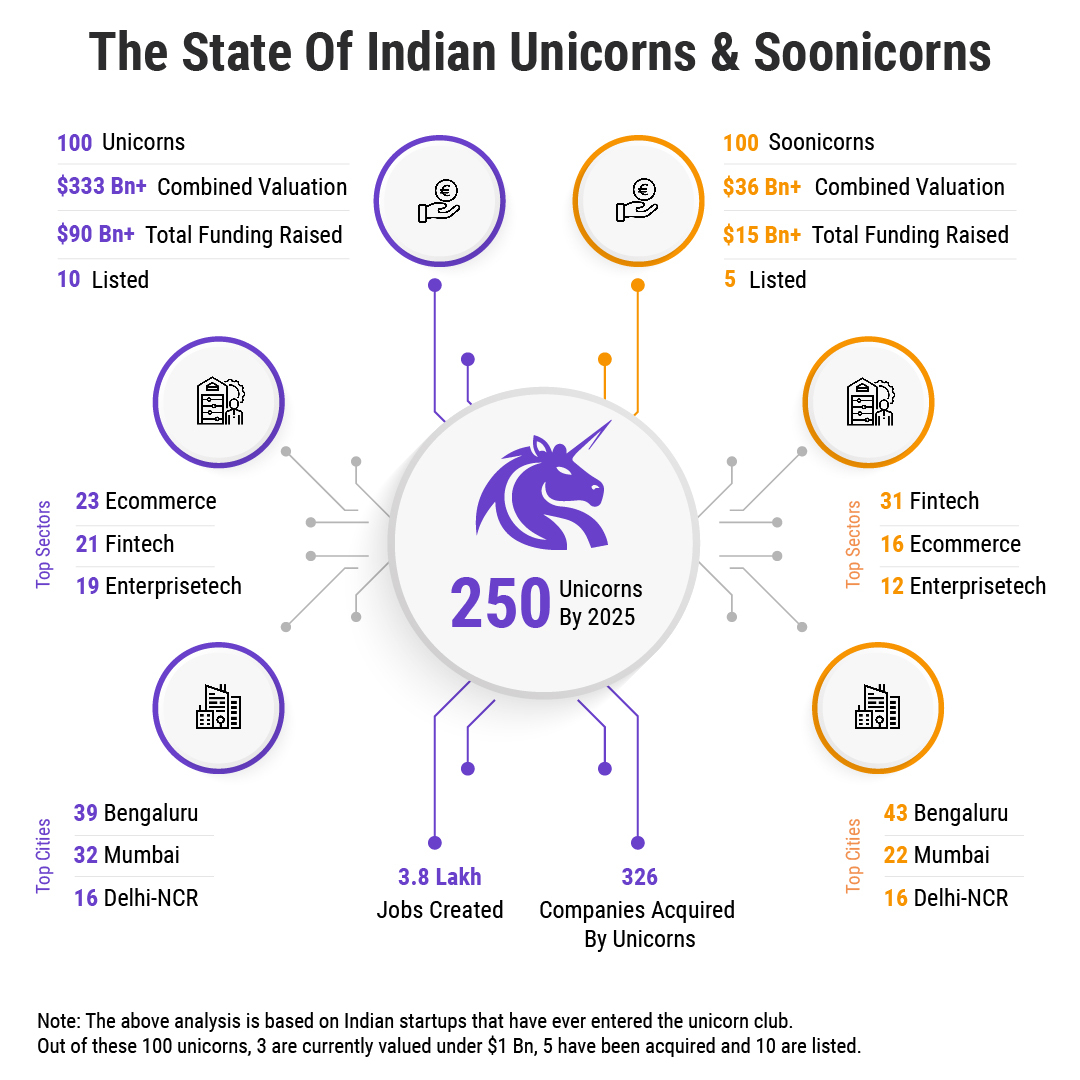In 2021, India had 44 unicorns, taking the total number to 86; the bullish valuations snowballed in 2022 and 14 startups joined the club in Q1 CY22
The 100 unicorns from India have a cumulative valuation of $333 Bn – with Flipkart and BYJU’S being the two highest valued privately-held startups
Some upcoming sectors that have and will mint newer unicorns include AVGC, D2C, ecommerce enablers, deeptech, spacetech, cleantech and the drone industry, among others
Indian startups are finally catching up with the world, with a whopping 100 startups now part of the fantastical unicorn club (startups with a valuation of $1 Bn+). This week, neobank Open secured its centenarian position in the coveted club by raising $50 Mn from IIFL, Temasek, Tiger Global and 3one4 Capital.
India got its first unicorn in 2011, and a decade later, the 100 unicorns from India have a cumulative valuation of $333 Bn – with Flipkart and BYJU’S being the two highest valued privately-held startups. Today, India ranks third in terms of startups with a $1 Bn+ valuation, only after the US and China.
The Indian startup ecosystem has been celebrating the achievement for the past few days. In fact, the announcement of the 100th unicorn in India saw a range of reactions from the ecosystem, as many pointed toward the glorious run of startups in the past decade and others remarked on the growth possibilities within the country.

Inc42 asked some active unicorn founders what they thought of the achievement and what awaits the future of the startup ecosystem.
“Crossing the 100th unicorn milestone is a proud moment for the country and the entire startup ecosystem. This is just the beginning of a long journey,” remarked B2B marketplace unicorn Udaan’s cofounder Sujeet Kumar.
Kumar added that with policies such as the Startup India Initiative, GST Reforms, PM Gati Shakti and others, India will be able to create many more unicorns in the future. Udaan joined the unicorn club in 2018 and was India’s fastest unicorn at the time.
Edtech unicorn Vedantu’s Vamsi Krishna joined the celebratory event and said, “The rise of India as a global superpower is inevitable and entrepreneurs will be the ones driving it.100 unicorns are just a start. We will soon become the startup capital of the world.”
India’s highest-valued startup and one of the earliest edtech unicorns – BYJU’S cofounder Divya Gokulnath took to social media to be a part of the celebration of this major milestone.
Download Unicorns Of India Report
She said, “We [BYJU’s] became India’s 16th unicorn [13th according to Inc42 estimates], just seven years after we started operations. The valuation did not matter to us, but the milestone did because it was one of the few at that time which put India on the map. Today, for the first 100 Indian companies which made it, it’s a mark that we are on a mission to create something of value and something from India for the world.”
HR tech startup Apna’s founder & CEO Nirmit Parikh remarked that registering the 100th unicorn is solid proof that India has accelerated its speed to become the innovation capital of the world. “The country has unlocked economic growth possibilities in the last few years, and it will continue to create a global impact,” he said.
The Key Enablers Expanding The Indian Billion Dollar Club
“India’s startup ecosystem has grown by leaps and bounds in recent years, with dozens of new unicorns and innovative startups. It’s a testament to the grit and hard work of founders and their teams and their ambitious goals. The government’s focus on fostering an environment conducive to entrepreneurship has also been a key enabler,” said Vidit Aatrey, founder & CEO of unicorn Meesho.
Aatrey’s comment is largely based on several initiatives and a slew of policies launched by the government of India such as FoF and thematic funds, incubation programs and tax holidays and tax benefit schemes, among others. Now, with a massive tech transition to digital services and products in place and an active internet subscriber base of over 834 Mn (as of September 2021), India is now ready for the next stage of tech evolution.
100 Unicorns In 11 Years, Can India Reach 250 By 2025?
Neobank Open’s entry into the unicorn club comes a month after India got its 98th & 99th unicorn. Furthermore, megadeals/large funding rounds were missing from the ecosystem over the past few weeks, and the stakeholders were overwhelmed that the ecosystem may have been approaching a bubble.
But India had reported 44 unicorns in 2021, taking the total number to 86 by December 2021. Thus, the milestone of 100 unicorns was closer than Inc42’s prediction in 2019! Thanks to the digital transformation accelerated by the Covid-19 pandemic, the bullish valuations snowballed and 14 startups joined the club in 2022 alone.
Fintech unicorn slice founder and CEO Rajan Bajaj told Inc42, “Unicorns no longer just denote the fantastical creatures wandering about in a wonderland. The word is more synonymous with the game-changing startups who tirelessly execute to make lives easier for the world. It is a sign of our collective and inclusive growth. I wish the next hundred comes in half the time it took us now.”
Download Unicorns Of India Report
Bajaj is not entirely alone in wanting the rapid entry of Indian startups into the club. Aarin Capital’s TV Mohandas Pai recently stated that India will have 250 unicorns by 2025, provided the government solves some structural issues.
OYO founder & CEO Ritesh Agarwal noted that a wave of digitisation across the country has resulted in the record growth of unicorns in the past two years, creating a symbiosis between new-age tech startups and small businesses.
“The pandemic has taught founders to build more resilient businesses and as technology startups and SMBs join forces, India will be well on its way to creating more such unicorns in the days to come. The question is not if India will have them, it’s only when,” he added.
2021’s last unicorn – D2C Mamaearth’s cofounder Ghazal Alagh joined the celebrations and remarked that it took India eight years to have the first 50 unicorns and 2 and a half to have another 50.
“This is growth. We are just getting started and this decade belongs to Indian entrepreneurs and the Indian startup ecosystem. Let’s keep building and driving our nation’s economy. I bet we will hit 150 in the next 12 months!,” Alagh said.
The Next Gen Sectors & Potential Unicorn Miners
The government sees a potential of 1,000 startups with a valuation of $1 Bn+ by 2025. For that, one needs to deep dive into the potential sectors that may emerge at the forefront with scalability prospects and the potential to have a large number of consumers.
Crypto unicorn CoinSwitch founder Ashish Singhal said that India reaps the benefit of the IT industry since Indian IT firms were early movers in the segment. “We’re at an even bigger opportunity now with Web3, which has the potential to become the new internet. India will have even more unicorns if we create an enabling regulatory framework,” he added.
Not just Web3, some upcoming sectors that have minted unicorns in recent years include gaming and entertainment, ecommerce (especially D2C), ecommerce enablers and ecommerce roll-up, deeptech, agritech, tech infrastructure, among others. Some sunrise sectors include spacetech, cleantech and the drone industry, among others.
Gaming unicorn MPL cofounder & CEO Sai Srinivas is hopeful that the government support will enable many homegrown companies in varied sectors to lead the world.
“It is very encouraging to see this steady evolution of India’s startup ecosystem. Many of these companies are not just building products for India, but for the world. Startups, especially in sunrise sectors like AVGC, will contribute significantly to the Indian economy’s growth over the next 25 years – the Amrit Kaal,” he said.
We Have A 100 $1 Bn Startups, Where Is The $1 Tn Startup?
The world is home to a handful of trillion-dollar companies and India is still building the decacorn club. India is home to less than 10 decacorns [startups with a valuation of $10 Bn], and even Indian corporates have never reached the $1 Tn+ valuation horizon – the trophy still belongs to the US startup ecosystem.
“It is remarkable to see how Indian startups have been hitting the $1 Bn mark. India has come a long way from providing technology talent to building globally successful, homegrown startups that are redefining innovation in every industry. The billion-dollar tag of a unicorn is not just about growth or prestige, but more importantly, it’s a testament to India’s solution-oriented and world-changing thinkers. With the right combination of observation and imagination, the next trillion-dollar startup could come from India!” said Harshil Mathur, CEO & cofounder of fintech unicorn Razorpay.
Download Unicorns Of India Report



![Read more about the article [Techie Tuesday] From a reluctant engineer to building a next-generation contact centre platform at Intuit India: Hima Kurian’s journey](https://blog.digitalsevaa.com/wp-content/uploads/2021/09/Image6ubg-1631533801623-300x150.jpg)






